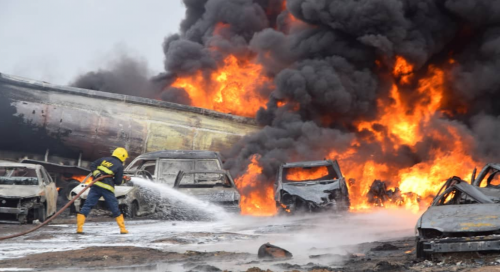As the city of Beirut, Lebanon, boils from the ruins of a blast that shattered almost 200 lives, with about 600 critically injured and property worth billions destroyed, Lebanese from across the country seem to have awaken from a slumber to take their destinies in their hands.
With the eruption of powerful and earth-shaking protest demanding a holistic change in the country’s deeply divided, fantastically corrupt and religious but ungodly society, the time seems to have come for the country’s cabal to take a bow and pave the way for a real transformation with the people as its centre.
Already, the Prime Minister of the small Mediterranean country, Hassan Diab, has been dragged to resignation with few courageous acts from various quarters signifying the country may be walking towards total freedom from the clutches, yokes and iron fists of corrupt and powerful elements who have held the country by the jugular for years on end thereby stifling progress and slowing development.
The story of beirut’s blast, though heart-wrenching and emotionally melting, is not so much different from that of the Nigerian state of Borno, where Internally Displaced Persons (IDPs) are littered across the country and beyond with starvation, suffering and sickness caused by the dreaded and bloodthirsty Boko Haram sect.
Both Beirut and Borno’s ruins exemplify the inherent danger of poor and bad leadership; with looting, stealing and lying to the people as a branded style thereby making life pretty difficult for the masses.
Indeed, the destruction and damage done in the North-East states of Borno, Adamawa and Yobe; with kidnapping of school girls in Chibok and Dapchi, are enough reason to force a responsible government out of power and bring in new minds with fresh ideas on how to fix the rot in the system, salvage the country from the mess of corruption.
While the Beirut blast typifies government’s entrenched flagrant disregard for precautionary measures despite years of warnings, that of Borno and other war-ravaged states in Nigeria show the nonchalant and lukewarm attitude of the country’s leaders to the plight of the people.
From worsening insecurity, skyrocketing unemployment, beatification of ethnic chauvinists and adulation of religious bigots, the leadership of the country – a resources-rich and the continent’s most populous state tipped to lead Africa to the Promise Land – has indirectly led its people to hell and perdition with administrative malfeasance and mind-blowing corruption.
Indeed, the political change that swept the country in 2015 has neither met the yearnings and aspirations of the people nor has it raised the standard of infrastructure and leadership competence to meet international standards.
Therefore, except a drastic approach takes place in areas of insecurity, corruption, unemployment, education and other integral parts of the country, happenings in Lebanon may just be a child’s play to what Nigeria may witness.
Muftau Gbadegesin – [email protected] 090651768**

 Join Daily Trust WhatsApp Community For Quick Access To News and Happenings Around You.
Join Daily Trust WhatsApp Community For Quick Access To News and Happenings Around You.


